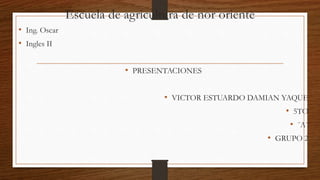Victor estuardo damian yaque grupo 2 practica 2 5to a
- 1. Escuela de agricultura de nor oriente ŌĆó Ing. Oscar ŌĆó Ingles II ŌĆó PRESENTACIONES ŌĆó VICTOR ESTUARDO DAMIAN YAQUE ŌĆó 5TO ŌĆó ┬©A┬© ŌĆó GRUPO 2
- 2. Past Simple You use the past simple when you want to talk about something at a definite time in the past (for example yesterday, last night, in 1993 etc)
- 3. Examples ŌĆó 1) I lived in Greece when I was a child...But now I live in Italy. ŌĆó 2) We celebrated mom`s birthday last Saturday. ŌĆó 3) It played the violin last night.....
- 4. exercises ŌĆó 1.I meet Adam and her sister two days ago. ŌĆó 2.They win the jumping race last year. ŌĆó 3. We played basketball last week. ŌĆó 4. May buy a new cassette recorder last month. ŌĆó 5.He catch a fish yesterday.
- 5. Simple present ŌĆó Use the Simple Present to express the idea that an action is repeated or usual. The action can be a habit, a hobby, a daily event, a scheduled event or something that often happens. It can also be something a person often forgets or usually does not do.
- 6. Examples ŌĆó ŌĆóI play tennis. ŌĆó ŌĆóShe does not play tennis. ŌĆó ŌĆóDoes he play tennis? ŌĆó ŌĆóThe train leaves every morning at 8 AM. ŌĆó ŌĆóThe train does not leave at 9 AM. ŌĆó ŌĆóWhen does the train usually leave? ŌĆó ŌĆóShe always forgets her purse.
- 7. Exercises ŌĆó I (travel) ŌĆ”ŌĆ”ŌĆ”. to London every week. ŌĆó They (run) ŌĆ”ŌĆ”ŌĆ”. in the park every Saturdays ŌĆó My mother (clean) ŌĆ”ŌĆ”ŌĆ”. the house. ŌĆó You (be) ŌĆ”ŌĆ”ŌĆ”. a good student.. ŌĆó Mary (work) ŌĆ”ŌĆ”ŌĆ”. in a bank.
- 8. Future simple ŌĆó Simple Future has two different forms in English: "will" and "be going to." Although the two forms can sometimes be used interchangeably, they often express two very different meanings. These different meanings might seem too abstract at first, but with time and practice, the differences will become clear. Both "will" and "be going to" refer to a specific time in the future.
- 9. Examples ŌĆó You will help him later. . Will you help him later? ŌĆó You are going to meet Jane tonight. . Are you going to meet Jane tonight?
- 10. exercises 1.The train will arriveis 11:20. 2.Wait! I will helpam you. 3.I am afraid they will eat everything by the time we arrive
- 11. Past perfect ŌĆó The Past Perfect expresses the idea that something occurred before another action in the past. It can also show that something happened before a specific time in the past
- 12. Example ŌĆó I had never seen such a beautiful beach before I went to Kauai. ŌĆó I did not have any money because I had lost my wallet. ŌĆó Tony knew Istanbul so well because he had visited the city several times
- 13. exercises ŌĆó 1) Peter played football yesterday. ŌĆó 2) They has cleaned the car. It looks new again ŌĆó 3) Last year we went to Italy
- 14. Present perfect ŌĆó We use the Present Perfect to say that an action happened at an unspecified time before now. The exact time is not important. You CANNOT use the Present Perfect with specific time expressions such as: yesterday, one year ago, last week, when I was a child, when I lived in Japan, at that moment, that day, one day, etc. We CAN use the Present Perfect with unspecific expressions such as: ever, never, once, many times, several times, before, so far, already, yet,
- 15. Examples ŌĆó I have seen that movie twenty times. ŌĆó I think I have met him once before. ŌĆó There have been many earthquakes in California. ŌĆó People have traveled to the Moon. ŌĆó People have not traveled to Mars.
- 16. Exercises ŌĆó 1) I just a new mobile phone. ŌĆó 2) you a cat without a tail? ŌĆó 3)My sister never sushi. ŌĆó 4)We hear your new tape yet.
- 17. Future perfect ŌĆó Future Perfect has two different forms: "will have done" and "be going to have done." Unlike Simple Future forms, Future Perfect forms are usually interchangeable.
- 18. Examples ŌĆó You will have perfected your English by the time you come back from the U.S. Will you have perfected your English by the time you come back from the U.S.? ŌĆó You will not have perfected your English by the time you come back from the U.S.
- 19. Exircises ŌĆó ) Anne will have repaired her bike next week. ŌĆó 2) We shall have done the washing by 8 o'clock. ŌĆó 3) She will have visited Paris by the end of next year. ŌĆó 4) I shall have finished this by 6 o'clock. ŌĆó 5) Sam will have left by next week


















